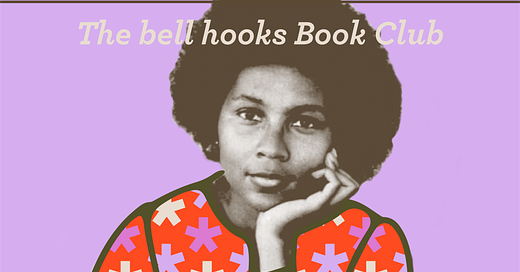The first time I read All About Love it was the summer of 2020. Covid was still destroying communities and the protests demanding justice for George Floyd and other Black folks murdered by police had come and gone.
I was on a plane, risking Covid to see my auntie and provide support while my uncle underwent brain surgery. My uncle Allen and I had become much closer after my father died by suicide three years earlier, but we were still just beginning the process of really getting to know each other; this diagnosis was another wound for the both of us. We thought we had time to make up for all of the lost time, and we didn’t.
A moment from the introduction will stay with me forever:
Everyone wants to know more about love. We want to know what it means to love what we can do in our everyday lives to love and be loved. We want to know how to seduce those among us who remain wedded to lovelessness and open the door to their hearts to let love enter. The strength of our desire does not change the power of our cultural uncertainty. Everywhere we learn that love is important, and yet we are bombarded by its failure. In the realm of the political, among the religious, in our families, and in our romantic lives, we see little indication that love informs decisions, strengthens our understanding of community, or keeps us together. This bleak picture in no way alters the nature of our longing. We still hope hat love will prevail. We still believe in love’s promise.
Our society is a system of lovelessness. We live in a white supremacist capitalist imperalist patriarchy (I have to thank hooks for this incredible summary of the United States), and love has never been a core value. There is no love in a system that declared some people 3/5ths of a person, or that breaks every single treaty (over 400!) it signs with indigenous tribes, or that still allows slavery as a means of punishment for crimes. There is no love in a system that prioritizes profit over people, that dehumanizes those experiencing homelessness or those fleeing other countries, that does not respect the bodily autonomy of its individuals.
And then there is the micro-side of lovelessness. Families where dysfunction is the norm, like mine. Relationships where people desire control over cooperation, where people lie to one another to avoid difficult conversations, where we are taught to see everyone as a competitor instead of a collaborator. People who prioritize jobs or easiness or selfish gain or their comfort over community and accountability.
American individualism has left so many of us surrounded by lovelessness. There is a loneliness epidemic in this country, especially for men—the group that perpetuates and is most harmed by lovelessness. All of this is made worse because we don’t have a universally applicable definition, something tangible to hold on to when we talk about love.
bell hooks provides that definition. Not only does she define love, but she examines every aspect of our lived experiences—childhood, romance, community, work, addiction, politics, friendship, death, family—through her framework.
All About Love helped me recalibrate. It helped me show up more for my aunt and my uncle. I took stock of every relationship in my life, from friendships, romantic partners, and family to the relationships I had with students, colleagues, and parents. It helped me see all the areas in my life where I had never, not once, experienced love, and the few areas where I had, like my aunt who treated me like I mattered even though my father had tried his best to keep us separated, and my uncle who encouraged my writing even as my father threatened to sue.
The book became a compass for me, or a new foundation to build my life moving forward.
Our white supremacist capitalist imperialist patriarchy has done a really good job of silencing the voices of marginalized folks, but the truth is that there is more innovation, imagination, and bravery among marginalized communities. Marginalized folks know this already; white folks are far behind. bell hooks is one of the most important voices of the last few decades precisely because she operated from the margin and did so from a place of love. If we center the voices of those who had to shout to be heard, what will change? If we understand that what our society tells us is “normal” and “right” is actually oppressive and dehumanizing, what can we create when we learn from people who have always understood what our system is? How can we shape our society to be something other than it is? Where do we even begin?
Answering those questions, or tackling those questions in community, is why All About Love is the book for Theory & Practice’s flagship course. We have to start somewhere; beginning with how we love is a fitting first step.



